
An altering macroeconomic environment means that cost management requires continual attention by pension plans and other institutional investors.
Today, as inflation and higher-for-longer rates exert upward pressure on institutional investors’ costs in a variety of areas, from technology to team member salaries, it’s time once again to re-evaluate the fees being paid to external asset managers.
Investors should consider whether the terms could decline due to higher rates for example disproportionately benefitting asset managers versus their institutional investor clients. In other areas, there’s new scope for investors to obtain savings through fee reductions in private markets and improved tools for transaction cost analysis and environmental, social and governance comparison, for example, can translate to a material bottom line improvement.
Read: U.S. institutional investors paid $1.5 billion in management fees in 2022: report
Long-term fee trends have stalled, in some cases reversed
In equities, fixed income and hedge funds, the broad trend of falling active management fees during the 2010s doesn’t appear to have continued into the ‘turbulent twenties.’
Fixed income strategies have seen some fee compression since the coronavirus pandemic took place, but higher-for-longer rates and positive flows to investment grade bonds have now taken the heat off many active managers after more than a decade of anemic returns. In equities, the broad trend from active to passive or quasi-passive strategies represented a persistent source of pricing pressure for stock pickers through the 2010s, though this has slowed somewhat into the 2020s.
Conversely, in private markets, where fee levels had broadly proved more stubborn in the 2010s, recent lower-than-expected fundraising is now supporting a modest migration to more investor-friendly terms. Annual capital raising for the four major illiquid asset classes — private equity, private credit, private real estate and infrastructure — rose by more than 400 per cent between 2010 and 2021. Now, weaker-than-anticipated fundraising in 2022 and 2023 has placed institutional investors in a much stronger position to extract better terms.
In real estate, institutional investors have seen notable savings in fund terms. Improvements in other illiquid asset classes such as private credit, infrastructure and private equity are more nuanced. Even where official terms appear not to have improved, some managers have come up short on fundraising targets and have extended their first-close discounts, ultimately ending up with a higher proportion of their limited partner group paying lower fees.
Read: Removal of ‘30% rule’ could boost investment, reduce private equity fees for Canadian pension funds
Escalating ESG expenses
A key theme for institutional investors to watch, from a cost perspective, is the subject of ESG fees and expenses. According to a recent survey from bfinance, nine in 10 asset managers said their ESG-related spending has “increased materially” over the past three years, citing factors such as expensive climate data and regulatory reporting requirements. The key question appearing from the survey, which considered responses from more than 400 asset managers, is how the burden of these costs should be shared between investors of various profiles and managers.
According to the study, only half of asset managers believe that strategies involving significant ESG resourcing should be offered at the same price-point as comparable/equivalent strategies with low ESG resourcing requirements. However, in a parallel study of more than 200 institutional asset owners, a majority expressed a belief that ESG resourcing shouldn’t affect a strategy’s overall price. That said, less enthusiastic investors are concerned about footing the bill for resources required for other more ESG-focused clients. Given the scope for managers to potentially charge more, the evaluation of the ESG component of a strategy is essential and is adding greater complexity and opportunity to fee discussions.
Hurdle rate headache
On the other hand, hurdle rates across hedge fund and private market sectors have largely remained unchanged, even as higher-for-longer rates have increased return expectations in many asset classes. While there are signs of change, particularly within separately managed accounts, there isn’t evidence of a significant shift in average pooled fund terms including hurdle rates. While returns have risen in several alternative asset classes, holding minimum hurdle rates steady has produced an increased delta between performance and the hurdle rate, which is translating to greater fee leakage for outcomes that, arguably, aren’t driven by the actions of the manager.
Read: 44% of U.S. pension plan sponsors set to review, renegotiate fees: survey
Room for reductions
Over-payment can be the result of longevity: the relationships delivering core low-cost exposures are typically ‘sticky’ and remain in place for long periods of time. It may also be the result of prioritization: low-fee strategies naturally can sometimes attract less cost scrutiny than their expensive counterparts. Elements of ESG and use of bespoke indexing can also confuse the fee picture on these mandates.
Within equity and fixed income strategies, institutional investors are raising their game on fees through the use of sophisticated transaction cost analysis techniques to better understand the total cost structure of the strategies including underlying trading costs. This can often highlight surprisingly sub-optimal trading practices; fee leakage can be as material as any headline manager fee and provide valuable insights to support negotiations.
Fees and alignment of interest have to be re-evaluated as macroeconomic and industry conditions evolve. Whether guarding against deteriorating terms, taking advantage of investor-friendly shifts or providing true value for money assessment as options become more complex, institutional investors still need to keep costs in sharp focus.
Read: Survey finds 95% of U.S. public pension funds employ investment consultants
